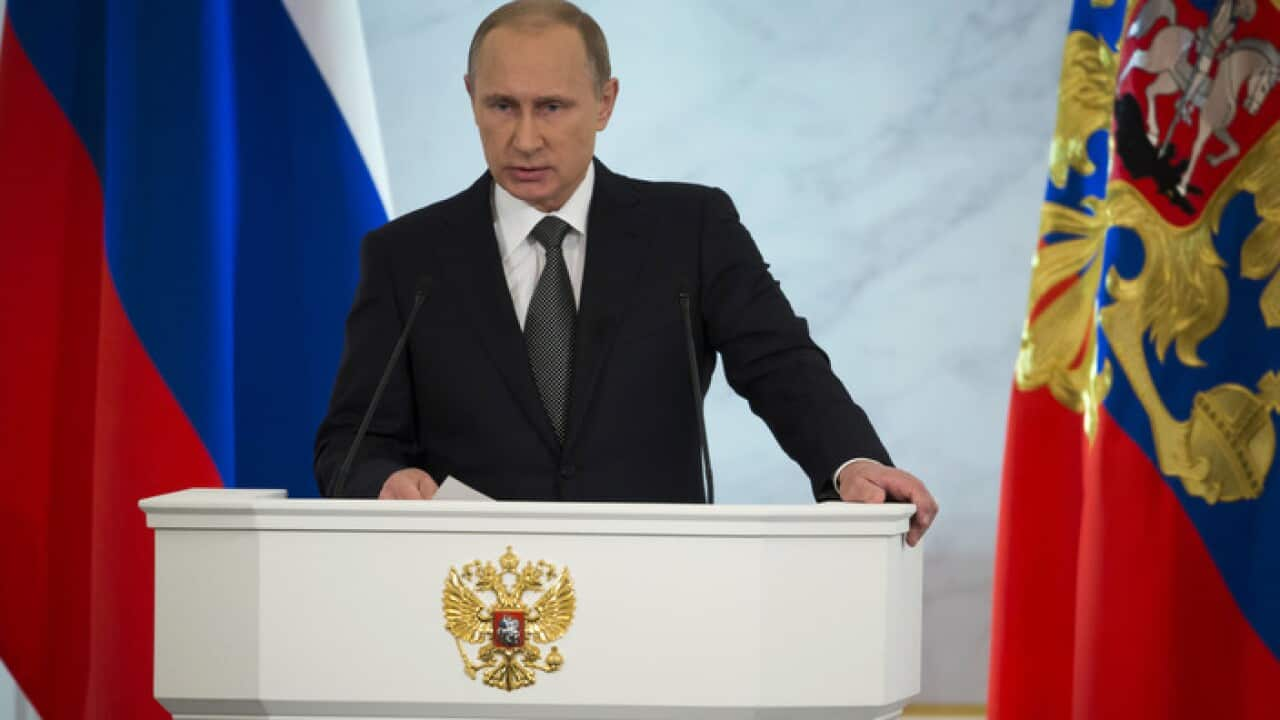(Transcript from World News Radio)
Russia's President Vladimir Putin has accused the US and other Western countries of seeking to break up his country.
The remark follows a series of recent statements by the Russian and US leaders that have echoes of the Cold War.
Olga Klepova has the details.
(Click on audio tab to listen to this item)
In a speech in Washington, US President Barack Obama has made one of his strongest statements yet about his Russian counterpart.
Mr Obama accused Vladimir Putin of leading Russia to self-isolation.
"I think the situation in Ukraine caught him by surprise. He has been improvising himself into a nationalist backward looking approach to Russian policy that is scaring the heck out of his neighbours and badly damaging his economy and sanctions are having a big bite on their economy."
In his annual state of the nation address at the Kremlin, Vladimir Putin hit back.
He referred to what he called the aggressive actions of the West, including sanctions imposed over its support for pro-Russian separatists in Ukraine.
(Translated)"These sanctions that we suffer are harmful, yes, but they are harmful to all, including those that are imposing them. This is not just a nervous reaction of the United States or the EU and the changes in Ukraine and the question of the Crimea. I would stress that if all this was not so then they would have thought of some other reason to hold back the growing strength of Russia. And when anyone thinks that Russia is getting too strong and independent, then these instruments are applied."
Amid the war of words, the popularity of the Russian president in his own country does not seem to be waning.
One recent opinion poll put support for Vladimir Putin's politics above 80 per cent.
Egor Piskunov is a correspondent from the State-controlled TV channel Russia Today.
He says that the sanctions haven't had the effect in Russia that Western countries hoped.
"He is actually becoming more popular in Russia as the confrontation between Russian and the West increases I think this is probably the opposite effect of what initially the officials in the West wanted".
Dr Robert Horvath is a specialist in Russian politics at La Trobe University in Melbourne.
He believes that there are two explanations for the anti-Western tone in recent speeches by Vladimir Putin
"The first explanation is that Putin is responding to series of Western actions such as democracy-promotion in a former-Soviet space, the expansion of the EU and the imposition of sanctions. The second explanation which is held by many Russian opposition activists, whereas Putin's anti-Westernism is bound up with the construction of an authoritarian regime in Russia itself, in order to outlaw opposition parties."
Despite Western sanctions helping to push the Russian economy into recession, Vladimir Putin remains defiant about Russia's economic prospects.
He's promising Russia will surpass world average economic levels of growth within three to four years.
Observers say that has echoes of an unfulfilled promise in 1963 by the charismatic Soviet leader Nikita Khrushchev.
At the peak of the Cold War, he declared an intention to surpass the economic growth of capitalist countries.
"At the moment you are ahead of us. We still have a lot of work to do to catch up with you. We will do that. We will do our best. Well catch up well surpass you and we will go forward. That's my conviction. You may perhaps laugh now. But when we overtake you, we'll wave our hands and say "Capitalists! Good bye. Our train is going ahead. Catch up if you can!"

